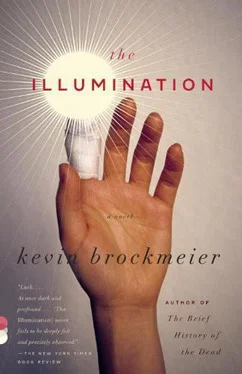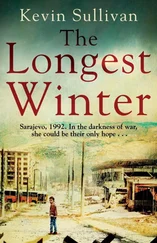“Who’s Jason?”
“My husband.”
“Is he all right?”
“They won’t tell me. They say I need my rest. But I don’t see how he could have …” Her voice sank out of hearing. “I kept asking him if he was okay—‘Are you okay? Answer me if you’re okay’—but he wouldn’t, wouldn’t answer. He just hung there upside down in his seat belt.” Already Carol Ann had seen several hours of footage about the strange illumination of the injured. She imagined an incandescent lightbulb flooding the car with light until it burned out with a pop. She watched the woman swallow and then bow her head, inadvertently pulling her hair taut. “Every morning he left a note for me on the refrigerator with a different reason he loved me. He never missed a day. I write them down in my book. Would you like to see?”
She indicated the journal lying on the cabinet between their beds. Carol Ann reached for it and let it fall open to a random page: I love those three perfect moles on your shoulder—like a line of buttons. I love the sound of your voice over the phone when you’re trying to hide the fact that you’re doing a crossword puzzle from me. I love your lopsided smile. I love the way you leave a little space between each piece of bacon on your plate: “amber waves of bacon.” I love the way you sway and close your eyes when you’re listening to a song you like—a dance, but only from the waist up. I love that moment in bed when you first climb on top of me, and the uprooted smell we leave behind when we’re finished. I love the feel of your hands on my cheeks, even when they’re “ ‘cold as tea.’ ‘Hot tea?’ ‘No, iced tea.’ ” I love the fact that when you accidentally pick up a hitchhiker, what you’re worried about is that he’ll steal the DVDs you rented. I love your fear of heights and bridges. I love the way you can be singing a song, and all of a sudden it will turn into a different song, and you’ll keep on singing and won’t even realize it .
Carol Ann shut the journal, letting the silk bookmark trail over her wrist. “That’s beautiful.”
The woman in the other bed nodded, and it might have been intuition, or commiseration, or just the last timed dosage of the blue pills Carol Ann had taken, but she could tell that what she meant to say was, Yes, it was beautiful. It was. It was .
“You keep it,” the woman told her.
“You don’t mean that.”
“I do. I couldn’t bear to read it again.”
“You don’t want to give something like this away. It’s too intimate.”
The silence that followed had a strange bend to it. It drew itself out while an old man pushed a walker with tennis balls on its feet to the nurses’ station at the far end of the hallway, then pivoted around with a series of metallic clacks. Eventually the woman let her breath run out, turned her face away, and said to Carol Ann, “You don’t understand at all.”
Later that day, around four in the afternoon, Carol Ann was watching a hawk wheel over the pine trees outside the window when the woman in the other bed lit up like a signal mirror. The glare was so bright that it suffused the glass, extinguishing the hawk in midflight. A team of doctors and technicians rushed to the woman’s side. Carol Ann shielded her eyes as they worked over her body with their equipment, saying things like, “She’s in full arrest, cardiac and respiratory,” and, “Sunglasses! I need some sunglasses here!” and, a few minutes later, “S.C.D. at four… thirteen. You can stop now, Miriam. I’ve called it.” One by one the doctors left, and the room fell quiet. The outlines of the shadows began to soften again. The light arising from the woman’s bed slowly dwindled until her skin held only a cool spectral glow, like phosphorescent moss in a cave. Carol Ann did not have enough faith in her powers of observation to tell exactly when the light winked out, only that there came a moment when it appeared the woman’s pain was no longer radiating from her body. Her hair had been freed from beneath her back. She lay with her eyes closed, her lips parted as if to take a breath. Once again, it seemed, she was confined to the borders of her flesh.
When the same orderly who had helped Carol Ann drink from the Evian bottle that morning came to box up the woman’s possessions, Carol Ann stopped him from taking the journal. She slid it to her own side of the cabinet and pinned it down with her bad hand.
“No, that’s mine.”
The orderly shrugged. “If you say so, ma’am.”
He turned his back to her as he finished his work, avoiding her eyes as he emptied the woman’s lunch tray, folded her blanket, and with the help of another orderly hoisted her onto a gurney. Carol Ann knew that she would probably never see him again, and also that it would not matter if she did, for in that instant she had become a thief to him.
Soon after she left the hospital, Carol Ann developed a preoccupation with her wound, testing it a dozen times a day for signs of light and pain. Dr. Alstadt had warned her to avoid the temptation, but she could not resist it. At work or at home, whenever the thought crossed her mind, she would remove the glove splint from around her thumb so that she could trace the cut with her index finger. Her nail had grown over the top line of the incision, but the front and the sides were still exposed, and a narrow welt had formed there, healing up around the stitches. The pain was not as pronounced as it had been before, and neither was the light, but if she bent her thumb just right, guiding it into the injury, it would begin to radiate from the inside, pink and warm, showing a tiny net of capillaries and a curved silhouette of bone. It reminded her of the sleepover parties she used to attend when she was in elementary school, how all the girls would take turns shining a flashlight through their hands, making their palms sway around in the dark like Japanese lanterns. When she was finished examining herself, she would put the glove back on and seal the straps, and she would think about the hospital and the stand of pine trees and the tranquillity the blue pills had brought her, and if she was at home she would let her eyes drift to the light from the window, and if she was at work, to the light from the computer. She was employed by a subscription news service, compiling accounts of the day’s major stories for various players in the stock and banking industries. Every day she devoted a portion of her assortment to what people had begun to call the Illumination. There was the story of the presidential task force that had been formed to investigate the phenomenon. The story of the Midwestern teenagers cutting luminous tattoos into their skin. The story of the Korean scientist who had spliced a gene of fluorescent jellyfish protein into a feline embryo to create a kitten that glowed in the dark. The story of the Palestinian suicide bombers who interpreted the footage of their brothers’ lives ending in an explosion of golden mist as a sign that their cause was blessed by the Lord. She knew that some of these incidents would have no foreseeable effect on the marketplace, but since neither her boss nor her clients seemed to object to them, she kept including them in her packets.
Frequently her mind returned to the woman she had met in the hospital. Maybe it had something to do with her office door, which swung closed with a hitch at the three-quarters mark, brushing against the carpet and then continuing on with a pair of clicks, a sound that suggested the way the woman’s voice had broken. Or maybe it was the simple fact that Carol Ann had never seen another person die. She remembered the woman’s clear blue eyes, and her deliberate style of blinking, and how long it took the incandescence to fade from her body after the doctors pronounced her gone. And why, Carol Ann wondered—why would it have lingered like that? Were we outlived by our pain? How long did it cling to the world? She had held on to the woman’s journal, and every day, after she got home from work, she allowed herself to read a page as she relaxed on the sofa: I love the ball you curl into when you wake up in the morning but don’t want to get out from under the covers. I love the last question you ask me before bedtime. I love the way you alphabetize the CDs, but arrange the books by height. I love you in your blue winter coat that looks like upholstery fabric. I love the scent of your hair just after you’ve taken a shower. I love the way, when I take my wedding ring off to do the dishes, you’ll put it on your finger and walk around the house saying, “I’m married to me, I’m married to me!” I love how nervous you get when I’m driving. I love the way you say all the things you dislike are “horrible”—and how, when you’re really upset, you pronounce it “harrible.” I love the little parentheses you get beside your lips when you’re smiling—the way the left one is deeper than the right. I love the fact that I know I can keep telling you things I love about you for the rest of our lives and I’ll never run out .
Читать дальше












